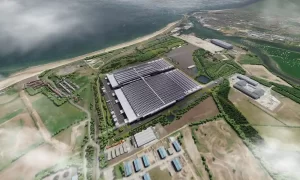
An Australian-based startup, Recharge Industries, has made a nonbinding offer for the collapsed UK battery company Britishvolt that could revive plans to construct a large plant in northern England.
The bid was lodged in the UK late on Tuesday, shortly after a cash crunch at Britishvolt sent the company into administration. The collapse has severely dented the country’s attempts to modernise its automotive industry and supply the next generation of UK-built electric vehicles.
Hundreds of jobs were made redundant as the cash ran out, and plans to build a £3.8bn (A$6.7bn) “gigafactory” near Blyth in Northumberland left in tatters.
The Recharge Industries bid was first reported by the Australian Financial Review.
A successful offer would give Recharge, an Australian company that sits under New York-based investment firm Scale Facilitation, immediate scale in a burgeoning industry. It also plans to start building a battery factory in Geelong, the former car manufacturing hub south-west of Melbourne.
The proposed lithium-ion battery plant would not use Chinese or Russian materials, a decision that leverages Australia’s deep mineral deposits and limits supply chain risks.
Scale Facilitation’s Geelong-born founder and chief executive, David Collard, said a Britishvolt deal made strategic sense.
“Strengthening our friends in the UK, especially when most others are kicking them when they’re down, is in our interest and definitely in the spirit of Aukus,” Collard said, referring to the trilateral security pact.
Britishvolt said earlier this month it was in talks over a majority sale but then promptly fell into administration, with the accounting firm EY now assessing its assets. The company has an extensive intellectual property portfolio which includes various licences, patents and module designs.
Management had been in talks with a number of potential investors, including existing investors and an obscure Indonesia-linked group. The Guardian previously revealed that DeaLab Group, a UK-based private equity investor, and an associated metals business, Barracuda Group, were in talks over a £160m rescue deal.
EY has previously said the UK company did not have sufficient equity for its research and development of facilities, prompting the appointment of administrators.
The next stage of a sale process would typically involve approved bidders accessing the data room, where detailed information about the company’s operations is kept.
Britishvolt was hoping to build the factory in phases to take advantage of rising EV demand ahead of the UK’s 2030 ban of new petrol and diesel cars. The plant was expected to employ about 3,000 workers when operating at full capacity and would have been able to supply 30 gigawatt hours (GWh) of batteries a year.
The UK government had promised to provide £100m to support the project as countries around the world try to modernise and clean up their industrial processes to take advantage of new technology.
The chief executive of Recharge Industries, Rob Fitzpatrick, said the operation would provide the Australian company with greater access to Europe should the offer proceed.
“Demand for lithium-ion battery storage is continuing to go through the roof,” Fitzpatrick said.
Read more:
Australian startup Recharge bid could revive UK battery company Britishvolt






